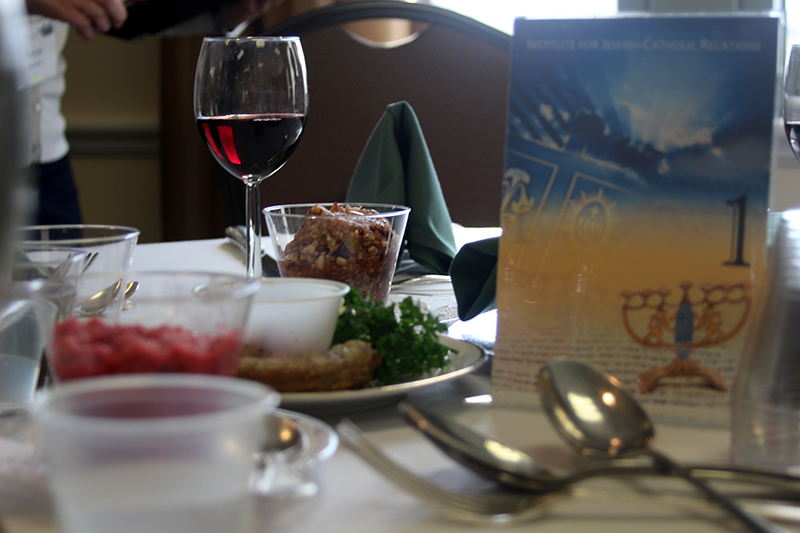
A table is set at an interfaith seder hosted by the Institute for Jewish-Catholic Relations at St. Joseph’s University, April 1, 2019. The ritual meal is a highlight of the Jewish holiday of Passover, which commemorates the ancient Israelites’ divine liberation from enslavement as described in Exodus. (Gina Christian)
Passover invites Christians to recognize Jesus’ Jewishness, and their own “close kinship with Jesus’ Jewish brothers and sisters.”
That’s according to professors Philip Cunningham and Adam Gregerman, who co-direct the Institute for Jewish-Catholic Relations at Saint Joseph’s University.
Founded in 1967, the IJCR is the oldest university center of its kind in the U.S. created in response to the Second Vatican Council’s call for increased interfaith dialogue.
[hotblock]
Celebrated each spring, the Jewish holiday of Passover commemorates the divine liberation of the ancient Israelites from enslavement in Egypt, as recounted in the book of Exodus. For eight days (seven in Israel), Jews abstain from food or drink with leavened grain, while gathering at their homes for one to two seders, or ritual meals.
Following a traditional sequence set down by Jewish rabbis in the fifth and sixth centuries, the seder (from the Hebrew word for “order”) recalls the events of the Israelites’ captivity and deliverance through symbolic foods, wine, Scriptural passages, prayers and songs.
Though scholars remain divided on whether the Last Supper was an actual seder, Holy Thursday itself “occurred at Passover time,” said Cunningham.
Jesus himself is called the “paschal lamb,” a term that “derives from the Hebrew word for Passover, Pesach,” Cunningham observed.
Through the seder ritual, the events of the past are made present, and both Jewish and Catholic faith traditions have corresponding concepts in this regard: the Catholic understanding of anamnesis, through which Christ’s passion, resurrection and ascension are memorialized at Mass; and the Hebrew zecher, or call to remember.
Gregerman said that “historically and theologically, it would be valuable for Christians to learn about and appreciate the context out of which (their) religion emerged.”
Prior to COVID, the IJCR helped to facilitate just that by hosting an annual interfaith seder, whose attendees included seminarians from St. Charles Borromeo Seminary in Wynnewood. At the last such gathering in 2019, Msgr. Gregory Fairbanks, professor of church history at the seminary, brought 11 students so that they could “experience the common roots of our faith with Judaism,” a practice encouraged since the Second Vatican Council.
“We also want them to recognize the integrity of the Jewish faith and their traditions, and to grow together in friendship, love and respect,” he said at the time.
“Recognizing Jesus’ Jewishness seems to be an essential part of knowing who Jesus was,” said Gregerman.
Both Jews and Christians can “learn in dialogue” with one another, he added, describing the practice – “which has been happening and continues to happen” – as “a blessing for both our communities.”
Earlier this week, Archbishop Nelson Pérez noted in his Passover message to the Jewish community that “this great feast is of significance to us all as it calls to mind the miracle of divine intervention in an hour of darkness.”
The celebration is an occasion for hope, said the archbishop, since “it reminds us that the Father will liberate us just as he liberated the Jews from Pharaoh’s enslavement, and that the pathway to true freedom is guided by the divine.”
Jews and Christians journey together to deepen their understanding of and relationship with the divine, said Cunningham.
“On Good Friday, we pray that the Jewish people, ‘the first to hear the Word of God,’ will continue to grow in the love of God’s name and in faithfulness to their covenantal life with God,” he said. “And at the Easter Vigil, several readings from the Old Testament make it clear that Jesus’ resurrection is an integral part of God’s ongoing relationship with the children of Israel.”
[hotblock2]
Although the pandemic has drastically limited in-person gatherings, “perhaps this modern plague will inspire us to treasure our traditions even more,” said Cunningham.
The final prayer of the Jewish seder, “Next year in Jerusalem!” expresses “the hope that all the Jewish people and all humanity will soon be freed from whatever oppresses them,” he said.
“This year, we Catholics can offer a form of the same prayer,” said Cunningham. “By this time next year, may the God who frees us from captivity to death free us from the tyranny of COVID-19!”
PREVIOUS: Cathedral sets schedule of Holy Week liturgies
NEXT: Food giveaway sparks ‘joy in the eyes’ of area families


Share this story